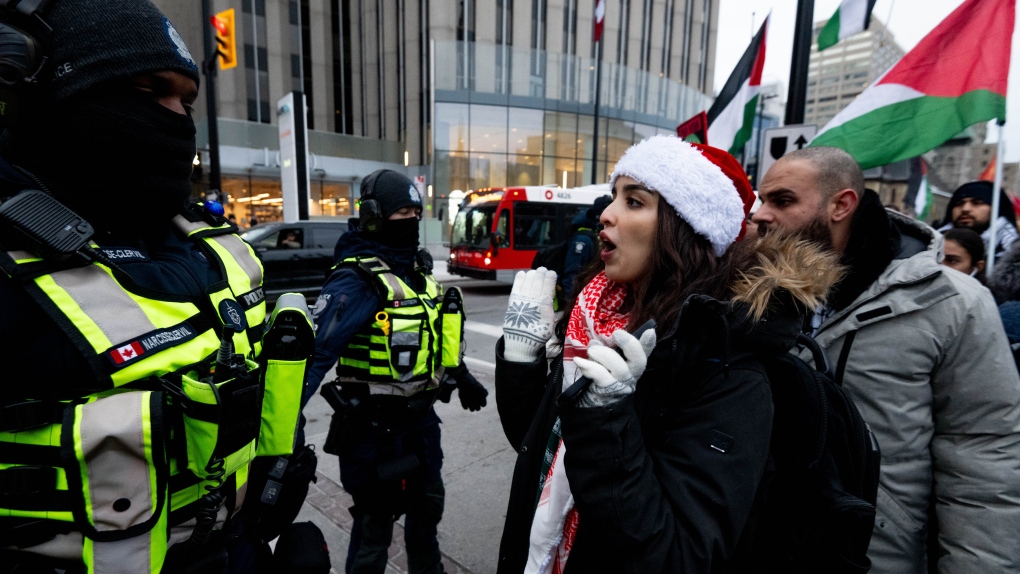
Ottawa’s city council voted on Wednesday to enable city staff to look into the feasibility of implementing a ‘bubble bylaw’ that could restrict demonstrations near certain community spaces, including schools and hospitals amid an increase in hate crimes.
The motion moved by Coun. Allan Hubley and supported by Mayor Mark Sutcliffe was passed despite councillors expressing heavy skepticism over the effectiveness of the bylaw and concerns it would impede on the constitutional right to protest.
Twenty-two councillors voted for the motion, with councillors Shawn Menard, Jessica Bradley and Sean Devine voting against after about an hour of debate.
The motion will direct staff to consider the feasibility of a “vulnerable social infrastructure” bylaw similar to one passed in the City of Vaughan earlier this year or consider alternate approaches to address harassment and hate speech at demonstrations. Staff will work with the Ottawa Police Service and Bylaw and Regulatory Services to be determine how it would be enforced.
Councillors will consider any recommendations staff make early next year.
“I want to let staff know how deeply uncomfortable I am with curtailing the right to protest,” said Coun. Jeff Leiper, who voted in favour of the motion.
“Every time we curtail democratic freedoms, we start to step on the turf of those generations of soldiers who died for those freedoms.”
Vaughan’s bubble bylaw restricts demonstrations within 100 metres or “a reasonable distance” from a religious institution, school, childcare centre, hospital or congregate care facility. Protesters who violate the bylaw face fines of up to $100,000.
Ottawa’s motion directly cites the Vaughan bylaw, something many councillors said could have unwanted consequences, including on the right to protest.
Both the Jewish Federation of Ottawa and the National Council of Canadian Muslims have supported implementing a bubble bylaw near religious institutions, with both groups seeing a rise in hate crimes since the Oct. 7, 2023 Hamas attacks and Israel’s subsequent offensive in Gaza.
Some civil liberties groups have said such laws impair freedom of expression.
Coun. Ariel Troster expressed concerns over the Vaughan bylaw, saying the measure has not been tested in court and imposes heavy fines on protesters. She said she’s conflicted with the bylaw’s consequences, referencing her identity as a Jewish woman and her background in advocating for civil rights.
“This is a really difficult time, but protest is meant to incite, it’s meant to disrupt and when people do that its because they’re desperate,” she said.
“I hope staff will take this seriously, I’m excited for this conversation. It’s going to be a tough one.”
Coun. David Hill said council has a responsibility to residents to put in place systems that ensure rights enshrined in the Charter of Rights and Freedoms are protected.
“We have a responsibility to them to put in place the systems that will best allow for all the Charter freedoms to be protected… but we cant overlook the fact that we don’t want people to feel intimidated or to feel hate or to be violated,” he said.
“I would suggest that enabling a motion that will enable that conversation is nothing but positive.”
Coun. Menard heavily disapproved of the measure, saying police officers already have tools available to them to combat protests that intimidate, incite or promote hatred or violence. Menard called the measure an “expensive” and “ineffective” move.
“There’s a real risk that if we allow this to fully expand, the civic spaces that everybody in Canada can use to speak up and dissent and express ideas will slowly shrink,” he said.
“No government, let alone municipal government, should want to put itself in a position to be the arbiter of which protests are acceptable, where and which are not. If there are acts of protests or civil disobedience, we agree with there are better way to deal with them and confront them than considering how the state can criminalize them and fine them.”
Coun. Hubley said the intent of the motion is to get the facts to make an evidence-based decision on the bylaw with the recommendations made from staff. He agreed some of the regulations in the Vaughan bylaw, including the $100,000 fine, are an overreach.
“We don’t want to overreach, we’re clear in the wording here that were not trying to interfere with labour protests or anything like that,” Hubley said.
“We’re hoping that staff will go away, take a look at it, come back give us some information and let us all decide on where we want to go.”
Hubley said the Criminal Code of Canada offers some tools to combat protesters that intimidate or threaten others, but in some cases, it doesn’t go far enough.
“Our priority was to try to protect the people that right now don’t feel protected,” he said.
Bubble zones have traditionally been used to protect abortion services and providers, but some provinces, including British Columbia and Nova Scotia, have expanded the rules to include hospitals and critical-care facilities after demonstrators protesting vaccine and masking mandates grew in the fall of 2021.
The Ontario government passed the Safe Access to Abortion Services Act in 2017 to establish safe zones around facilities that offer abortion services, as well as the homes and offices of abortion providers.
City councillors will make the final approval on any recommendations city staff make next year.